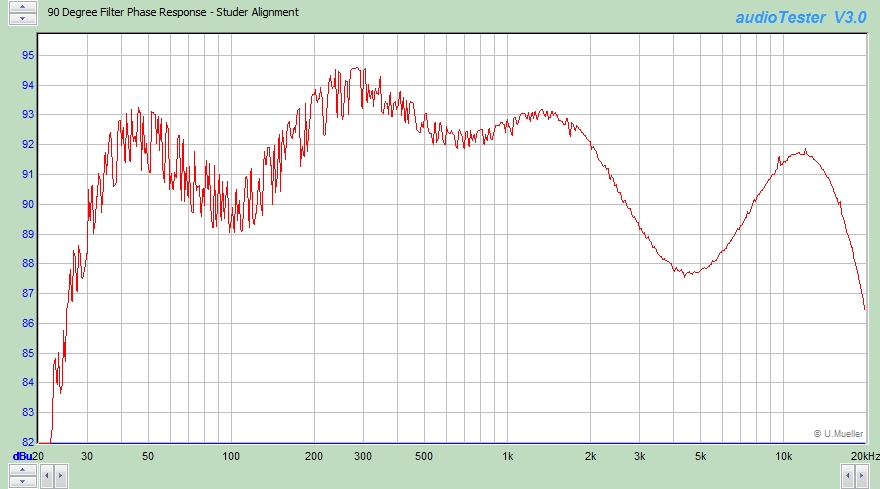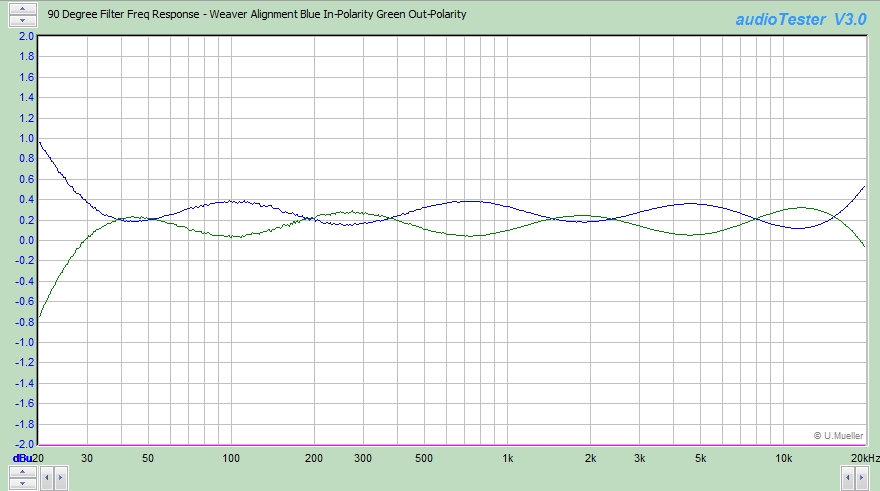The Studer "90°" Dome Filter Stereo to Mono Quadrature Summer
Re: The Studer "90° Filter" Stereo to Mono Summer/Recorrelator
This is a very interesting tool that I lack a use for. It's still great to think through the unintended results of straight mono summing versus this. I recently mixed a stereo webcast that was encoded in a camera for transmission, and the mono switch was accidentally deployed by the video tech; had this been built in, it would have saved the spaced pair piano.
Best,
Doug Williams
Electromagnetic Radiation Recorders
Doug Williams
Electromagnetic Radiation Recorders
- mediatechnology
- Posts: 5452
- Joined: Sat Aug 11, 2007 2:34 pm
- Location: Oak Cliff, Texas
- Contact:
Re: The Studer "90° Filter" Stereo to Mono Summer/Recorrelator
This is my interpretation of the Studer 90 Degree Dome Filter.
Thanks Doug for the post and pointing this out to me back in 2018.

"Recorrelator" Stereo to Mono Quadrature Summing Filter Based On The Work of Robert B. Dome and the Studer 90 Degree Filter Updated Weaver Alignment
I scaled the RC values for the first three sections to lower the resistance values.
Studer used a TL072 in the first stage - I decided I wanted the option of using bipolar op amps.
I call the 90 degree differential outputs "I" and "Q".
The mono sum is either L+R or I+Q.
I think I would control the relays with a rotary switch and make the positions as follows:
Stereo (bypass)
Mono I+Q
Mono L+R
Spatial IQ (pseudo-stereo)
The last position is to synthesize wide-field pseudo-stereo for making a mono keyboard present in stereo but still fold down to mono downstream.
J1 is either put in the A position for stereo in or B to feed the Left input to both channels.
An alternative to using the jumper would be to use TRS inputs and normal the tip and ring of the Left input to the Right Input TRS connector.
For mono in/pseudo stereo out only the left input would be patched.
Inserting an input to the right would then redirect the Q channel filter to the right input.
I don't see pseudo-stereo being used much.
The most-useful application IMHO is to make stereo synths mono-compatible.
In a day or so I'll post some mono conversion of stereo material that just sounds better than L+R mono.
Thanks Doug for the post and pointing this out to me back in 2018.

"Recorrelator" Stereo to Mono Quadrature Summing Filter Based On The Work of Robert B. Dome and the Studer 90 Degree Filter Updated Weaver Alignment
I scaled the RC values for the first three sections to lower the resistance values.
Studer used a TL072 in the first stage - I decided I wanted the option of using bipolar op amps.
I call the 90 degree differential outputs "I" and "Q".
The mono sum is either L+R or I+Q.
I think I would control the relays with a rotary switch and make the positions as follows:
Stereo (bypass)
Mono I+Q
Mono L+R
Spatial IQ (pseudo-stereo)
The last position is to synthesize wide-field pseudo-stereo for making a mono keyboard present in stereo but still fold down to mono downstream.
J1 is either put in the A position for stereo in or B to feed the Left input to both channels.
An alternative to using the jumper would be to use TRS inputs and normal the tip and ring of the Left input to the Right Input TRS connector.
For mono in/pseudo stereo out only the left input would be patched.
Inserting an input to the right would then redirect the Q channel filter to the right input.
I don't see pseudo-stereo being used much.
The most-useful application IMHO is to make stereo synths mono-compatible.
In a day or so I'll post some mono conversion of stereo material that just sounds better than L+R mono.
Re: The Studer "90° Filter" Stereo to Mono Summer/Recorrelator
I tried to match the Studer component values using the equations from Weaver.
Six of the eight resistors came close, but two were off by more than 10% ?
Calculated phase difference from the Studer schematic
Calculated phase difference from the Weaver values
Six of the eight resistors came close, but two were off by more than 10% ?
Calculated phase difference from the Studer schematic
Calculated phase difference from the Weaver values
- mediatechnology
- Posts: 5452
- Joined: Sat Aug 11, 2007 2:34 pm
- Location: Oak Cliff, Texas
- Contact:
Re: The Studer "90° Filter" Stereo to Mono Summer/Recorrelator
Thanks for doing the calculations.
What would be the Weaver values scaled similarly to my implementation?
It looks like the GroupDIY simulation of the amplitude response shows the same anomaly around 5 kHz as your Studer calculations.
I need to do a phase response plot.
I've never used that tool in AudioTester before.
I checked with fellow forum member "crin" who I consider to be a source material expert on European broadcast.
Apparently 90 degree filters are quite common in AM air chains.
Crin sent me pics of a LAWO 90 degree filter and I saw a number of LAWO W986 on ebay.
Some were 8 pole per channel others 4 pole.
What would be the Weaver values scaled similarly to my implementation?
It looks like the GroupDIY simulation of the amplitude response shows the same anomaly around 5 kHz as your Studer calculations.
I need to do a phase response plot.
I've never used that tool in AudioTester before.
I checked with fellow forum member "crin" who I consider to be a source material expert on European broadcast.
Apparently 90 degree filters are quite common in AM air chains.
Crin sent me pics of a LAWO 90 degree filter and I saw a number of LAWO W986 on ebay.
Some were 8 pole per channel others 4 pole.
Re: The Studer "90° Filter" Stereo to Mono Summer/Recorrelator
Using single E96 resistors per stage, the differences would be:
stage 2: 220N 12K7
stage 5: 10N 14K0
stage 6: 10N 5K36
stage 7: 1N 19K1
stage 2: 220N 12K7
stage 5: 10N 14K0
stage 6: 10N 5K36
stage 7: 1N 19K1
- mediatechnology
- Posts: 5452
- Joined: Sat Aug 11, 2007 2:34 pm
- Location: Oak Cliff, Texas
- Contact:
Re: The Studer "90° Filter" Stereo to Mono Summer/Recorrelator
Frank - Thanks for the values!
I'll try to run a phase plot on the original and modified values this afternoon.
I'll try to run a phase plot on the original and modified values this afternoon.
- mediatechnology
- Posts: 5452
- Joined: Sat Aug 11, 2007 2:34 pm
- Location: Oak Cliff, Texas
- Contact:
Re: The Studer "90° Filter" Stereo to Mono Summer/Recorrelator
Here's what the Studer 90 degree filter's phase response looks like using E96 roundings to Studer's original values.
Edit: This turns out to be "Wayne's Accidental Alignment" because I hadn't updated the protoboard to the exact values.

Edit: This turns out to be "Wayne's Accidental Alignment" because I hadn't updated the protoboard to the exact values.

- mediatechnology
- Posts: 5452
- Joined: Sat Aug 11, 2007 2:34 pm
- Location: Oak Cliff, Texas
- Contact:
Re: The Studer "90° Filter" Stereo to Mono Summer/Recorrelator
The Studer 90 degree filter's phase response using the improved "Weaver" alignment.

Studer 90 Degree Filter Phase Response Improved Weaver Alignment
The Weaver alignment looks ideal.
I need to redo the Studer response because I forgot to substitute the exact values I had just received from Digi-Key.
I think the values I used are, by accident, a little better than the Studer.
Updated Schematic

Recorrelator Stereo To Mono Quadrature Summing Filter With Improved Weaver Alignment
Thanks for running the sims Frank!

Studer 90 Degree Filter Phase Response Improved Weaver Alignment
The Weaver alignment looks ideal.
I need to redo the Studer response because I forgot to substitute the exact values I had just received from Digi-Key.
I think the values I used are, by accident, a little better than the Studer.
Updated Schematic

Recorrelator Stereo To Mono Quadrature Summing Filter With Improved Weaver Alignment
Thanks for running the sims Frank!
- mediatechnology
- Posts: 5452
- Joined: Sat Aug 11, 2007 2:34 pm
- Location: Oak Cliff, Texas
- Contact:
Re: The Studer "90° Filter" Stereo to Mono Summer/Recorrelator
This is the actual Studer 90 degree filter alignement.
It looks like Wayne's accidental alignment is better than the Studer's.
Clearly the Weaver is optimum.

Corrected Studer 90 Degree Filter Phase Response
It looks like Wayne's accidental alignment is better than the Studer's.
Clearly the Weaver is optimum.

Corrected Studer 90 Degree Filter Phase Response
- mediatechnology
- Posts: 5452
- Joined: Sat Aug 11, 2007 2:34 pm
- Location: Oak Cliff, Texas
- Contact:
Re: The Studer "90° Filter" Stereo to Mono Summer/Recorrelator
The summed frequency response is much better using the Weaver alignments.
The blue trace is the in-polarity response; the green trace is out-of-polarity response.

As can be seen "out-of-phase" inputs sum in at the same level as "in-phase" inputs owing to the near-constant 90° phase shift between channels.
The blue trace is the in-polarity response; the green trace is out-of-polarity response.

As can be seen "out-of-phase" inputs sum in at the same level as "in-phase" inputs owing to the near-constant 90° phase shift between channels.